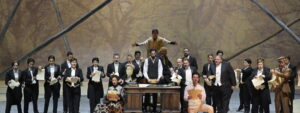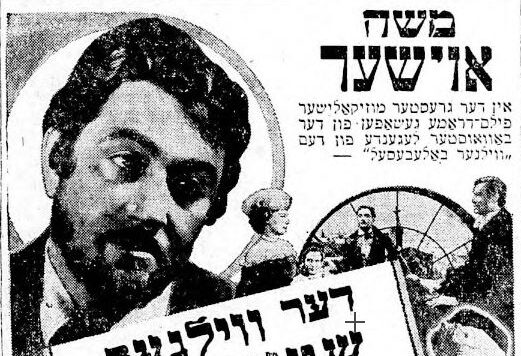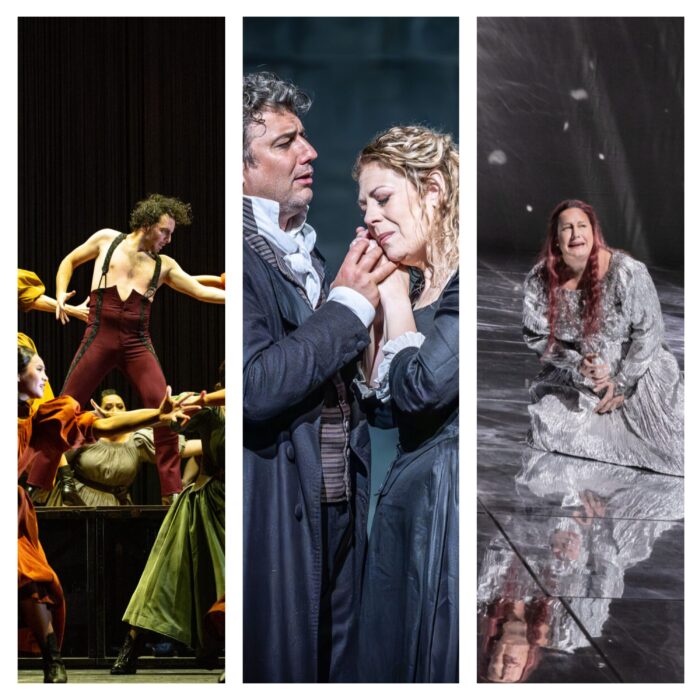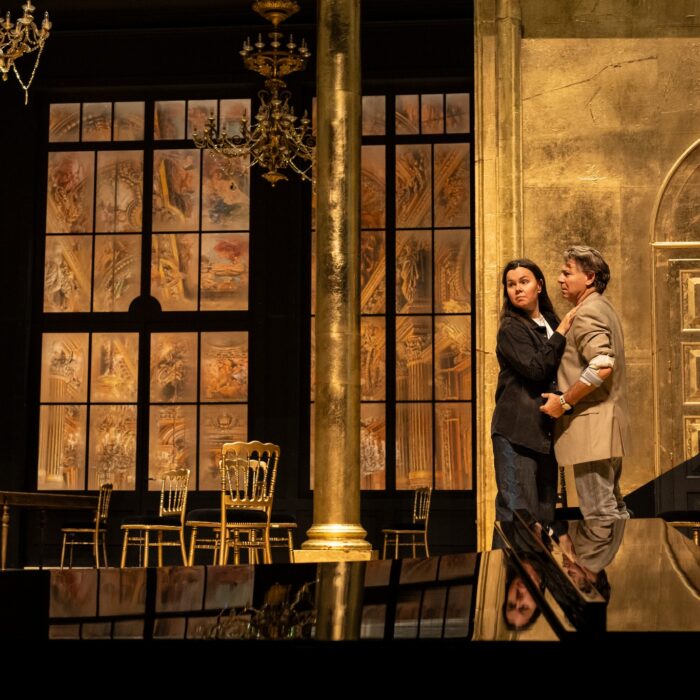
Opera Meets Film: Discovering Herzl Through Yonatan Cnaan and Ido Ricklin’s ‘Theodor’
By John Vandevert(Photo Credit: Israeli Opera House)
Taking three years to write, composer Yonatan Cnaan and director Ido Ricklin’s opera, “Theodor: The Unknown Story of Herzl,” is a summarization of Theodor Herzl’s life. It was premiered by the Israeli Opera House in 2023, following the attacks on October 7th, 2023. Conducted by Nimrod David Pfeffer, the evening was powerful and monumental. Luckily, it was filmed live, with the recording now available for viewing per request. But even more exciting was the announcement of the film’s American premiere at the beginning of September.
On September 23, the film had its American premiere. In speaking about the event, Cnaan writes, “Sharing Herzl’s vision and values through my music feels more urgent than ever.” So impactful, and topical, was the opera that it was named one of Opera Now’s World’s Best Operas of 2023. Returning to the Israeli Opera House in 2025, the opera and its filmed version are available for private screenings per request. Interestingly, other operas about Herzl also exist, like Alex Weiser and Ben Kaplan’s opera, “State of the Jews“ (2024), along with topical operas about sensitive topics like dam Gorb and Ben Kaye’s “The Path to Heaven“ (2024). Thus, Herzl’s legacy is secure and we are fortunate that artistic projects exist which spread his activities to larger audiences who don’t know him yet.
Let’s discover a little bit more about Herzl’s life, his many works, and the Jewish experience in opera.
Who Was Theodor Herzl?
Considered by many as the “father” of Zionism, Theodor Herzl (1860-1904) played a seminal role in popularizing the belief through various ways. Whether through distributed pamphlets like “Der Judenstaat“ (1896, Leipzig and Vienna), establishing the “World Zionist Organization” (WZO) with co-founder Max Nordau (1897), or via diplomatic relations with everyone priests to sultans, Herzl worked towards the dissemination and popularization of Zionism. From novels, “The Old New Land” (1902), to meetings with Pope Pius X, Herzl tried nearly everything.
Having grown up in the late-19th to early-20th centuries, a time of anti-Semitism, at first he advocated for a more assimilationist orientation before rejecting his desire to combat anti-Semitism by advocating for a more political position on the matter. Beginning in the late-19th century onwards, publications like the 1897 article, “Mauschel,” published in the newspaper “Die Welt,“ founded by Herzl the same year, became the principal documents which spearheaded the push towards realizing Zionism. Responding to the growing crises in European ways of life as industrialization, demographic shifts, and agrarian crisis, with many moving to urban regions for work, Herzl saw in late-19th Austro-Hungarian life that there were great divisions between how Jewish sects related to each other. While openly embracing European and non-Jewish cultural ways of being, referred to as “Jewish assimilation,” many did not, including Herzl who, starting his life as a “Germanophile,” transitioned after the “Dreyfus affair.”
He argued that the rife anti-Semitism was the push towards a fuller embrace of Judaism. While anti-Semitism was getting stronger, typified by British-German philosopher Housten Chamberlain’s 1899 book, “The Foundations of the Nineteenth Century,” only 17 years before Madison Grant’s 1916 book, “The Passing of the Great Race,” so too was Zionism. Following the establishment of the World Jewish Congress in 1897, along with the popularization of other pro-Zionist works like Leon Pinsker’s 1882 pamphlet, “Auto-Emancipation,” Herzl’s political activities grew more pronounced as the 20th century continued on. Participating in everything from the first of two “Hague Conventions“ in 1899, urging wealthy persons like Maurice de Hirsch to create organizations like the Jewish Colonisation Association (1891) and offshoots like the Palestine Jewish Colonization Association (1924), Herzl’s life was well spent. At the end of his life, he continued to advocate for a Jewish homecoming through diplomatic work across Europe. In 1903, after the 1903 Kishinev pogrom in the Russian Empire, repeated once again in 1905, he met with Russia’s first Prime Minister Sergei Witte to ask for the improved treatment of Jews in Russia.
His last act was the proposal of the “Uganda Scheme,” an ambitious plan to create a Jewish homeland in East Africa. Highly controversial as it went against previous goals laid out in Zionism’s first manifestation, the “Basel Program“ (1897), as well as being critiqued by the British for supporting Jews over their own people, it was ultimately rejected in 1905. However, as a result, the Jewish Territorial Organization was created to find a solution to the problem of a Jewish homeland outside of Palestine. In the decades and century after his death, Herzl’s legacy and work expanded with countless developments, tributes, and forms of legacy contributions to the cause of Zionism, and with this operatic film, his work has now become even more proliferated, albeit via a new medium.
“Jewishness” Through Opera
In Richard Wagner’s anti-Semitic essay, “Das Judenthum in der Musik“ (1850), he argued, “So long as the separate art of Music had a real organic life-need in it, down to the epochs of Mozart and Beethoven, there was nowhere to be found a Jew composer,” yet he was so very wrong. As revived, rediscovered, and recovered operas by Jewish composers have shown, the Jewish experience through opera is as powerful then as it is now. While both Richard Wagner and Robert Schumann despised Giacomo Meyerbeer on anti-Semitic grounds, hidden behind aesthetic critiques, he had a prolific career, including the operas like “Les Huguenots” (1836) and “Robert le diable” (1831).
From celebrated figures like Felix Mendelssohn to lesser-known figures like German Julius Eichberg, family friend of Mendelssohn, Jewish-Romanian composer Raoul Gunsbourg, championed by Tsar Alexander III of Russia, Adolphe Samuel, one-time friend with Berlioz, and Karl Goldmark, a prolific Viennese composer and cold acquaintance with Wagner, musical “Jewishness” is far from lacking in living essence. Most famously, Fromental Halévy’s acclaimed opera, “La Juive“ (1835), put both ‘Jewishness’ and Francophile grand opera on the map, celebrated by Wagner despite his anti-Semitic critiques. The ubiquity of anti-Semitism during the mid-late 19th century stopped many composers from hearing the beauty Jewish composers had to offer, only tolerating it in exceptional cases like that Halévy. Most unfortunate is the Strauss line’s short Jewish legacy, Johann Strauss I’s grandfather converting to Catholicism, whilst the Soviet composer Veniamin Fleishman’s musical infusions of Jewish folk music, incapsulated in his opera, Rothschild’s Violin (1939-41), shows that ‘Jewishness’ can thrive in difficult situations. Other later operas like Jacob Weinberg’s “The Pioneers” (1941-47) attest to such a state.
Capturing the different facets of the Jewish experience through opera has come in many shapes and sizes. From the first opera written in Israel, “Dan Hashomer“ (1945) by Marc Lavry and premiered in 1950, figures like Michael Ajzenstadt and his seminal contributions as part of Israel Opera, to contemporary Hebrew operas like “Mothers“ (2021), being Jewish through opera is as diverse as it comes. As historical revivals like the Ashkenaz Festival’s North American premiere of the only known pre-Holocaust Yiddish opera, “Bas Sheve“ (1924) also demonstrate, there is much we still don’t know about the Jewish experience through opera. Further, the 2022 premiere of Eugen Engel’s opera, “Grete Minde“ (pre-1941) never performed during his lifetime and killed in 1943, by Theater Magdeburg show that there are many Jewish composers and works not yet known to the wider world.
While historically-significant operas written during WWII like Kurt Weil’s “We Will Never Die“ (1943), Viktor Ullmann’s “Der Kaiser von Atlantis“ (1943) and Hans Krása’s “Brundibár“ (1944) are three particularly well-known examples of Jewish operas written during Nazi dictatorship, other post-war examples also exist which give audiences a stark reminder of the horrors that befell the Jewish community. Among the many examples, Shulamit Ran’s “Ann Frank“ (2023), Mikis Theodorakis’s celebrated “Mauthausen Trilogy“ (1988) and Jake Heggie’s two operas, “For a Look or a Touch” (2007) and “Another Sunrise” (2012), showcase and typify the immortal phrase, “Never again.” But, and it must be stressed, WWII does not define the Jewish experience nor the Jewish experience through opera. Post-WWII Jewish operas like Alexander Veprik’s “Toktogul“ (1940/1949), Josef Tal’s experimentalist operas, “Ashmedai“ (1969) and “Masada 967“ (1972), Bruce Adolphe’s “Mikhoels the Wise” (1982), and Solomon Epstein’s Yiddish-language opera “The Dybbuk: An opera in Yiddish“ (1999) show just how rich the pool really is. More contemporaneously, operas likes Gerald Cohen’s “Steal A Pencil For Me“ (2024), and the chamber opera “The Great Dictionary of the Yiddish Language“ (2024), keep the fire of creativity alive by marrying history with art.
Together with art, history, activism, and creativity, more of the Jewish experience will come to find an outlet through opera and it is only a matter of time when the next big opera comes to stages around the world. From Detlev Glanert’s “Die Jüdin von Toledo” (2024) to Evan Rapport and Daniel London’s “A Dying Person (A Goyses)” (2023), there are many folds of the Jewish experience not yet revealed and patiently waiting its turn to take the limelight.
Listen


